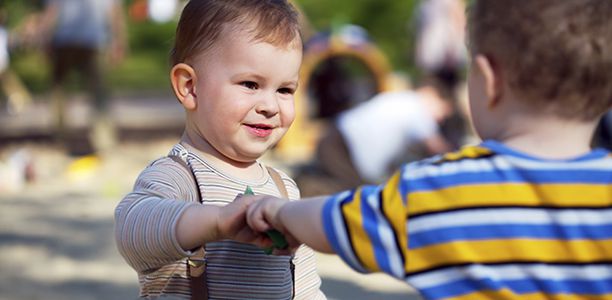A study to investigate how less time spent sitting at preschool affects kids’ energy levels, musculoskeletal health and mental development is underway at UOW.
The ‘Standing Preschools’ project, led by researchers at the Early Start Research Institute (ESRI), builds on previous UOW research that showed eight out of 10 Australian kids are in some kind of formal preschool setting each week. It is estimated half of their time there is spent sitting.
The study, funded by the Illawarra Health and Medical Research Institute (IHMRI), will measure children’s oxygen consumption and carbon dioxide production in order to gauge how much energy is expended while doing preschool activities.
Sitting has been referred to as ‘the new smoking’ for adults, with research showing that sitting for six or more hours per day increases your risk of early death by 40% compared to someone who sits for less than three hours per day – even if you exercise. But what about kids?
“If a young child spends excessive amounts of time sitting, they could be setting themselves up for a lifetime of poor health, particularly if they continue that behaviour as they go through school and into the workforce,” Director of ESRI and leader of the study, Professor Tony Okely, recently told the Sunday Telegraph.
Professor Okely (pictured above) said preliminary results had shown that less time sitting at preschool had a positive impact on cognitive development, particularly working memory and self-regulation.
“These skills are very important in an early age when neural networks are being laid down in a developing brain. And working memory and self-regulation have been shown to be better predictors of school readiness than a child’s IQ. So they will do better at school and enter school more ready to learn.”
Professor Okely said it had “become the norm” to sit down in a learning environment, while research has shown the converse: “you learn more effectively by standing up.”
His team are now working with preschool staff to identify ways to increase activities where kids stand or move around, rather than be seated.
“We’re looking at ways where we can easily modify the preschool environment. Either physically, with standing desks and standing lunch tables, or by changing the way lessons are planned.
“For example, if a child is learning about shapes, instead of drawing an oval in a workbook, she could walk along an oval-shaped line that has been taped out on the classroom floor.
“Another strategy is to break up sitting with short bursts of fun, high-intensity activities. So if kids have been sitting for 20 minutes, an egg timer will sound and three minutes of structured energetic play with ensue.”
Professor Okely and his colleagues will share their research at the inaugural “Early Start Conference” at UOW from 28-30 September. Early Start is the most sophisticated early childhood teaching, research and community engagement initiative ever undertaken in Australia. The conference will bring researchers and educators from around the world together to discuss how early childhood policy and practice can be improved.
(Source: University of Wollongong)










